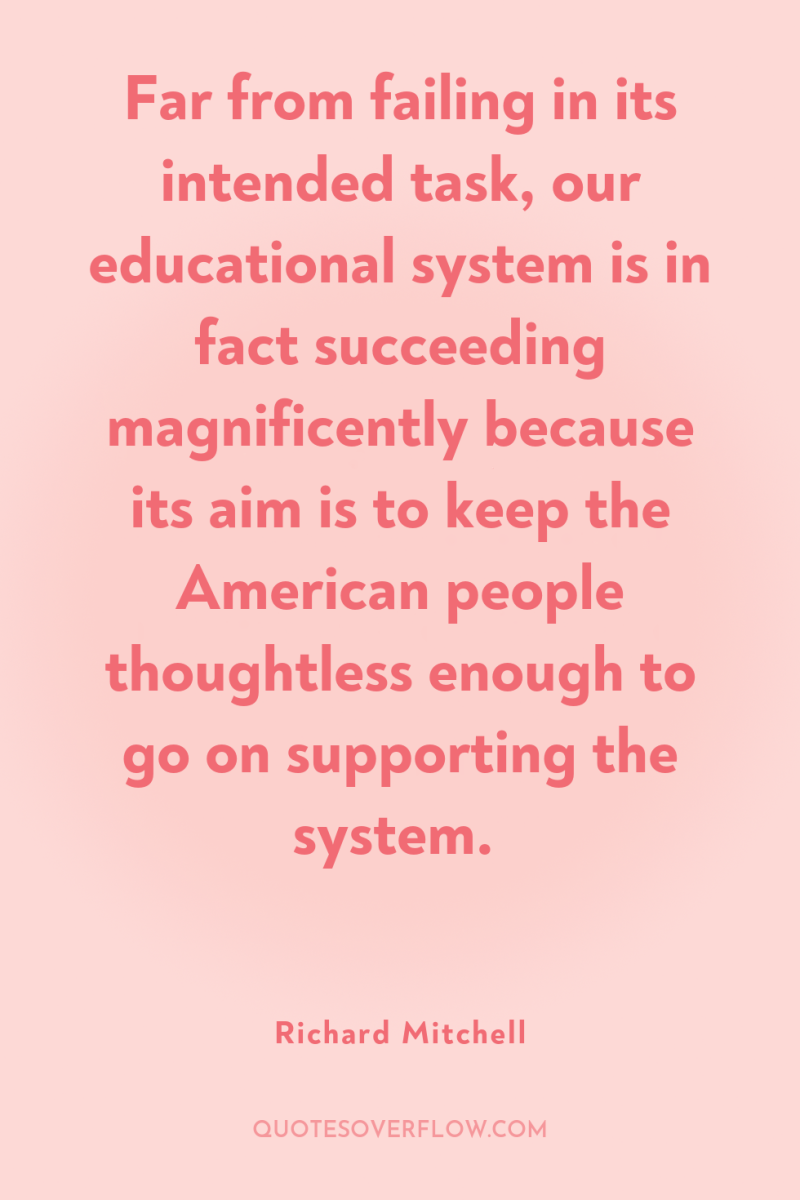
1
Far from failing in its intended task, our educational system is in fact succeeding magnificently because its aim is to keep the American people thoughtless enough to go on supporting the system.Richard Mitchell
2
Training is a good dog, a constant companion and an utterly loyal and devoted friend, and everyone should have one. Education is a nagging counselor. And, I am convinced, everyone does have one. It happens, however, that some nagging counselors have grown strong by a certain kind of nourishment. Others are weak and puny, even infantile, having never been nourished at all.Richard Mitchell
3
Here is a truth that most teachers will not tell you, even if they know it: Good training is a continual friend and a solace; it helps you now, and assures you of help in the future. Good education is a continual pain in the neck, and assures you always of more of the same.Richard Mitchell
4
Only in some very special cases is comprehension the point of reading--in things like recipes and "reading material." The point of reading is understanding, and comprehension is to understanding as getting wet is to swimming. You must do the one before you can hope to do the other, but you don't do the other simply because you do the one.Richard Mitchell
5
And that is to say, of course, that you can "read" a culture without its literature, without the bother of gathering and holding its ideas, considering their genesis and evolution, and weighing them in the balance with each other.Richard Mitchell
6
Words never fail. We hear them, we read them; they enter into the mind and become part of us for as long as we shall live. Who speaks reason to his fellowmen bestows it upon them. Who mouths inanity disorders thought for all who listen. There must be some minimum allowable dose of inanity beyond which the mind cannot remain reasonable. Irrationality, like buried chemical waste, sooner or later must seep into all the tissues of thought.Richard Mitchell
7
That's how ideas and the institutions they generate come to be in the first place. It is in strings of words that we make ideas. The words, however, can say anything that the language permits, which, in our case, is quite a lot, so a string of words can just as easily express inanities as ideas. When inanities are expressed, we can discover them just by paying attention to the words.Richard Mitchell
8
His prose, like the thinking it reveals, is full of cloudy suggestions of something beyond the range of mere cognition. He has been given power, if not over the entities and dyads, certainly over the ignorant and superstitious.Richard Mitchell
9
His jargon conceals, from him, but not from us, the deep, empty hole in his mind. He uses technological language as a substitute for technique.Richard Mitchell
10
Like prepositional phrases, certain structural arrangements in English are much more important than the small bones of grammar in its most technical sense. It really wouldn't matter much if we started dropping the s from our plurals. Lots of words get along without it anyway, and in most cases context would be enough to indicate number. Even the distinction between singular and plural verb forms is just as much a polite convention as an essential element of meaning. But the structures, things like passives and prepositional phrases, constitute, among other things, an implicit system of moral philosophy, a view of the world and its presumed meanings, and their misuse therefore often betrays an attitude or value that the user might like to disavow.Richard Mitchell
11
Some minds, at some point, discover that they can not make sense of their own predications without attention to grammar, although they do not ordinarily think of what they are doing as an exercise in grammar.Richard Mitchell
12
People who cannot put strings of sentences together in good order cannot think. An educational system that does not teach the technology of writing is preventing thought.Richard Mitchell